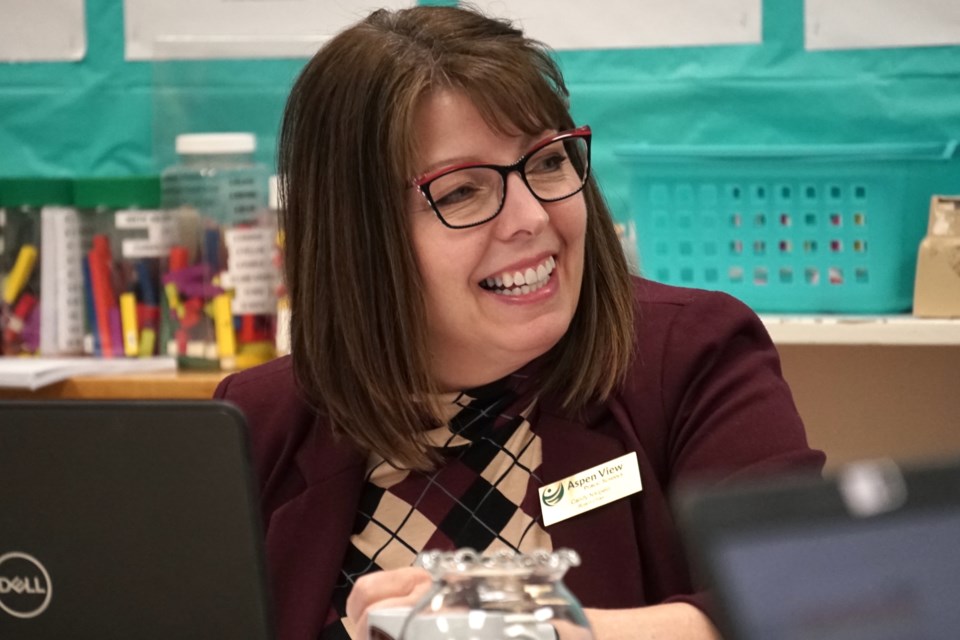SMOKY LAKE — Teachers and staff at Aspen View Public Schools (AVPS) now have formal guidelines for how to implement and deliver Indigenous education for all students.
While the provincial government works on broader policies for Indigenous education, AVPS administration moved most of the content from their divisional policy into an administrative procedure (AP), which trustees were able to review during the May 13 board meeting in Smoky Lake.
Katherine Mann, AVPS associate supt. of curriculum and technology, introduced the AP to trustees as a method of recognizing their schools exist and operate on Treaty 6 land, and support staff and educators in understanding the context of Indigeneity and Indigenous learning.
“The purpose of this procedure is to respect Indigenous worldviews, cultures and traditions and to meet the TRC’s Calls to Action on education,” read Mann from the AP.
“Guiding principles (include) ensuring inclusive and equitable learning environments for our Indigenous students, partnering with our Indigenous communities, acknowledging the historical and systemic barriers faced by Indigenous students,” she added.
AVPS’s two-page policy 32 on First Nation, Métis, and Inuit education contains a commitment to including authentic Indigenous perspectives and colonial history in their schools, achieving equitable results for all Indigenous students, and definitions of the terms Indigenous, First Nations, Métis and Inuit. Two appendixes with guidelines for smudging and engagement of Elders and Knowledge Keepers are also included.
Comparatively, the new five-page AP contains both appendixes included in the policy, and expands on a number of sections, such as roles and responsibilities for administrators, teachers, students, and families, and guidelines around delivery, evaluation and source material for Indigenous education.
AVPS teachers and educators will be responsible for including Indigenous worldviews, history and cultures into the curriculum, participate in professional development around anti-racism, and maintain welcoming classrooms where Indigenous students can express their cultural identities, initiatives already in action in a number classrooms and schools around the division.
The AP stipulates authentic resources must be used to impart Indigenous knowledge and content, resources developed by local Indigenous communities and vetted and reviewed by Knowledge Keepers.
Also included are commitments to ensuring both Indigenous and non-Indigenous students have access to courses on traditional languages, participate in and host activities and events like land-based learning, storytelling and smudging, and ensuring Indigenous students have spaces to gather, seek support, and celebrate their culture.
Graduation rates, grades, attendance and academic achievements of Indigenous students will continue to be monitored through measures like the Annual Education Results Report, and the division commits to identifying and addressing obstacles and barriers.
A section on anti-racism and inclusion lays out the pathways to address discriminatory language and behaviour in schools that Mann noted were included at the request of division staff.
“Principals asked for this, they wanted some guidance on how to address when incidents like that happen, what’s the process,” said Mann. “Also working through the restorative process, which I think is as important as the disciplinary process.”
Standard wording for land acknowledgements at Aspen View events or gatherings is baked into the document, with room for individual schools to add colour to their own acknowledgements by including local context from their nearby First Nation or Métis communities.
AVPS recommends proper care and attention is given to the ensuring proper pronunciation of Indigenous names, and the purpose of the statement itself.
Board chair Candy Nikipelo asked about the possibility of creating and including guidelines for schools hosting Indigenous Grad ceremonies to ensure cultural practices and traditions are respected and properly honoured.
“The schools are very clear on all their other events that they host, I just think some direction and help on this in an AP would be welcome by all the schools.”



